- Home
- Jim Thompson
The Alcoholics Page 9
The Alcoholics Read online
Page 9
“Yeth—I mean—”
“Say it,” said Doctor Murphy. “I don’t expect you to overcome a lifelong trait in a few hours. Just spit it out any way it comes to your mouth and then leave it lay. Don’t keep correcting yourself.”
Miss Baker murmured, “Yeth, thir.”
Doc said, “I don’t mean to be—uh—” And Miss Baker said, “Yeth, thir?” And he scowled and fumbled for a cigarette. He lighted it, half-way down its length, and cursed under his breath. He took one puff, and ground it out in the ash tray, grinding it into the metal until it was almost pulverized.
His eyes strayed from the tray, and, as though moved by an unseen magnet, came to rest on Miss Baker’s knees, at the exact spot where her knees were exposed by the split of her uniform. Absently, they moved up the uniform, exploring small pink-revealing gaps along the way. They moved on and up, then paused again: pitched temporary camp in the half-hidden environs of two cream-and-peaches, gently undulant mounds. They moved up—they were jerked up, suddenly, by another pair of eyes.
The owner of the eyes raised her hands from her lap, and re-secured the neckline of her uniform. There was prim reproof in the gesture, fear and reproof, yet with it…something else. A kind of unconscious invitation, a sort of mocking self-assurance. That’s settled—it said—and so are you. That takes care of everything…
“Now, Miss Baker,” said Doctor Murphy. “As I was about to say…”
“Yeth, thir?” Miss Baker slowly crossed her legs.
Oh, she knew, all right. She was scared out of her pants, but she knew what she had, and she was throwing it out at him, knowing damned well that he couldn’t do anything any more than…than he’d ever done anything. Any more than he could have given that dog-beater what he needed, or that waiter or that other nurse. Well, she had his number, all right. She knew she could slap him silly with it, and there wasn’t a goddam thing he could do about it. You could lose your license for a hell of a lot less than that.
“Yeth, Doctor?”
“Yes,” said Doctor Murphy. “As I was saying. I’m rather short on time, and there’s every likelihood that I’m going to have even less so I’d like to get right to the point. I want to know something about you. Your background. Your associates. Your—uh—”
“I thee. Well, I believe there ithn’t much to add to the information I’ve already given you. I—”
“That’s not what I mean. I’m talking about your personal life…You were an only child? Kept pretty close to home, were you?”
“Yeth,” Miss Baker nodded. “You might thay I was…”
“How did you get along with such childhood contacts as you had? Were you reasonably well-liked? Did you feel at ease, accepted?”
Miss Baker hesitated. She moved her head in a motion that indicated both yes and no. “Well, thuch friends as I had, Doctor…”
“I see,” said Doctor Murphy. “And those friends, I suppose, included boys?”
“Well…Ath many boyth ath girlth…”
“Uh-huh,” said Doc, and his eyes narrowed slightly. No friends at all? And was that her choice or theirs? Had she, being unable to accept the company of males, tried to rationalize the abnormality by also rejecting females? Well, skip it. Hit the center of the target and the rest would crumble. “You had no childhood sweethearts, Miss Baker?”
“No, thir.”
“Have you ever had a date with a young man?”
“No, thir.”
“Why not?”
“Well, I juth—well, I thuppoth there wath juth never anyone I cared—”
“Oh, come now,” said Doctor Murphy. “We can’t be too exacting in these things. People who might not appear too prepossessing at first glance can be very attractive when you get to know them better. All you have to do is give them a chance to let you like them.”
There was a small but very disconcerting smile on the rose-pink lips. She shifted a little in the chair, her legs still crossed, absently arching her breasts, smoothing the uniform over them, before she settled down again.
“Yeth, Doctor?”
“Yes,” said Doctor Murphy. “You’re not living a normal life. Because you’re not—well, when we suppress and ignore our normal instincts too long they become twisted. Permanently twisted, if we don’t take decisive counteraction. You’re young. You won’t have too much of a job on your hands if you tackle it now. So tackle it, Miss Baker, and don’t lose any time about it. Will you do that?”
“Well…juth how do you mean, Doctor?”
“Men. You know what a man is, don’t you?” Doctor Murphy tapped himself on the chest. “I’m one, believe it or not…Well, what do you say, then? Let’s get started on the job, huh? Will you do that?”
“Well…I hardly know how…”
“It doesn’t matter about hows or whys. Just make yourself available, get out to a show or a lecture or some such thing—and if you handle yourself right—don’t act standoffish or cold or frightened—well, the rest will take care of itself. You’ll be surprised how easy it will be. Will you try it, just once, even though it does go against your grain? Do it for my sake?”
“Well”—Miss Baker hesitated—“I gueth I could.”
“Good. That’s the spirit.”
“What time…when would you like to go, Doctor?”
“Oh”—Doctor Murphy shrugged—“Why don’t you—what? When would I like to?”
“Yeth, thir,” said Miss Baker demurely. “You did thay leth, didn’t you? You thaid I should do it for your…”
“Why, you”—Doc stammered—“you know damned good and well I—”
His mouth snapped shut, tightened into a thin white line.
It was always this way, by God.
“Miss Baker,” said Doctor Murphy, “uncross your legs!”
“Well!” said Miss Baker, and her own mouth snapped shut. “I’ll have you know—”
“You’ll do what I tell you, that’s what you’ll do. You’ll sit there until I’m through talking to you, and you will not try any more of the nonsense you pulled a moment ago. Do you understand me, Miss Baker?”
She was frightened, shamed, on the point of tears. But when there is nothing to do but fight, that is what you do. “I understhand I’ve taken just about all I’m going—”
“Oh, no, you haven’t,” said Doctor Murphy grimly. “You haven’t begun to. Why did you lie to me about Jeff Sloan? Why did you let me go on thinking he’d taken that antabuse, pretend that he was reacting to it, when you knew damned well that he hadn’t and wasn’t?”
“I didn’t thay he—!”
“You did it by implication. You did it deliberately to make me worry—to give me some trouble, as if I didn’t have enough already. And why did you do that? I’ll tell you. Because of what you’d done. You knew I knew about it, and you were afraid all hell was going to pop. So you screwed me up at what you thought would be your last opportunity.”
“I will not,” said Miss Baker, starting to rise. “I will not lithen to thuch vulgar—”
“So I’m vulgar, am I? Well, let me tell you what you are. A dirty, sneaky little sadist. Binding that poor helpless bastard’s scrotum up in the sheets! Oh, yes you did; I’d hate to think what the poor devil went through before Judson spotted the trouble. And what were you doing in there this morning? Something goddam rotten to make him yell like that! Good God, girl—you can’t go on this way! The longer you keep at it the worse you’ll get. Sooner or later, you’ll do something that—”
“Y-you! You having the unsthpeakable nerve to lecture me! A whithkey doctor—a—a—racketeer!”
“Now, wait a minute—!” Doc was outraged by the unfairness of the attack. “Why, damn you, you know I don’t—you know this is the one sanitarium where an alcoholic can—”
“Oh, yeth! You’re an angel, you are!” Miss Baker’s eyes sparkled with malicious triumph. “Well, what about thith poor Mr. Van Twyne that you’re tho contherned about? Thinth when doth a pre-frontal lobotomy cath
e belong in a plathe like thith? Where do you get off at—”
“Shut up,” said Doctor Murphy.
“I will not thut up! You tharted thith! Now I’m going to—”
“—to shut up,” said the doctor. “Now. Immediately. Because if you do not, my dear Lucretia”—he tapped her slowly on the knee, emphasizing each word—“I am going to wallop that sadistic little ass of yours so hard you won’t be able to sit down for the next six weeks.”
Miss Baker gasped. “Y-you big—”
“Six weeks, Lucretia,” said Doctor Murphy. “And don’t think I won’t love doing it. Now, you were about to say something?”
Miss Baker wasn’t about to, apparently. She sat, lips compressed, breast rising and falling in frustrated fury.
Doc nodded, satisfied, and turned to his desk. He wrote out a check and tossed it into her lap.
“You didn’t resign,” he said. “I fired you. Now pack up your duds and get out of here, and don’t take too much time or I’ll give you some assistance.”
14
Stretched out on the office couch, Doctor Murphy opened one reluctant eye and glanced at his wristwatch. After two o’clock, less than three hours, a little more than two hours and a half, before the Van Twyne’s physician, Doctor Perthborg, would arrive. Before his decision would have to be made. And he was as uncertain as to what that decision should be as he had ever been. He just hadn’t had time to think it through; there seemed never to be time to think anything through.
Doc sighed and swung his feet to the floor, sat with his elbows on knees staring glumly at the carpet. Judson had the right idea, all right. Not to live in the place. To have certain times for talking and administering to the patients, and, then, barring emergencies, to keep to yourself. Conserve your energies for major problems, that was the idea. Don’t chase all to hell over everywhere, dissipating your time on a thousand and one things which, if they needed taking care of at all, could just as well be handled by someone else.
The trouble, Doc decided, entering a new complaint in the case of Murphy vs. Murphy, was that he was a goddam know-it-all. He thought he knew everything, and that no one else knew anything. Had to go around sticking his nose in the job, sniffing and scowling and worrying, scolding and asking questions, getting everyone so mixed up they couldn’t find their ass with both hands.
Well! If he did decide to hold on here, there was going to be one hell of a change. He’d make a round of the patients in the morning and another in the evening. Meals would be served at certain hours, and no others, and if they didn’t eat then they could—
“Damn!” said Doctor Murphy, suddenly, and he leaped up and strode into the kitchen.
Josephine was seated at the kitchen work-table, sipping a cup of coffee before beginning the job of preparing dinner. Her face became noticeably glum at the doctor’s appearance, and her greeting was as barren of enthusiasm as a pawnbroker examining a dime-store ring.
“What you,” she said, “want now?”
“Nothing much”—Doc forced a laugh. “Nothing at all, really. Just a little milk toast and some soft-scrambled eggs—better fry ’em in butter and put just a dash of cayenne in them—and, oh, yes, a pot of hot tea.”
Josephine grunted. “Nothin’ at all,” she mumbled. “Ain’t nothin’ really at all, ’at ain’t. Who it for, anyway?”
“Miss Kenfield,” said Doc, and hesitated. “By the way, would you mind taking it to her? Rufus has his hands full with the men patients.”
“I got my hands full, too,” said Josephine. “How come Miz Baker don’ do it?”
“Miss Baker isn’t with us anymore. She’s getting ready to leave.”
“Now? She gettin’ ready to leave now?” Josephine displayed interest at last. “How come she do ’at?”
“Never mind. If you’ll just—”
“You fire her, I bet,” said Josephine. “How come you got to do it? You got to do it right now—couldn’t wait no little while?”
“I could not,” said Doctor Murphy, “and I will not discuss it. Now, please—PLEASE!—fix Miss Kenfield’s lunch and take it to her.”
“She ain’t goin’ to eat it, nohow.”
“Please,” said Doc. “just this once, please do what I ask you without arguing about it.”
“Ain’t arguin’,” said Josephine. “Just tellin’ you. She ain’t goin’ eat it. You want to do ’at woman a favor, doctuh, you give her nice big hot toddy. Hee, hee!” she cackled. “ ’At fix her up.”
Doctor Murphy glowered helplessly. “All right,” he said, “I give up. Just forget the whole thing. I should have known better than to ask. I’ve never known it to fail, by God—by Christ in heaven, I’ve never known it to fail! I ask you for some simple little thing and—”
“What you cussin’ an’ fussin’ about? Said I was goin’ to do it,” said Josephine.
“Well, do it then!”
“Ain’t no hurry,” Said Josephine. “She ain’ goin’ to eat it nohow.”
Doc turned and stamped out of the kitchen. Josephine’s shoulders shook with impish, silent laughter; then, sobering, she looked thoughtfully up at the ceiling.
She was relieved, in a way, that Miss Baker was departing, but, in another sense, troubled and saddened by the fact. She knew the regret that all conscientious people know when they have left unaccomplished some necessary task which they, and they alone, are capable of accomplishing. She had tried, of course, but her effort, upon reflection, appeared pitifully weak. In any event, tryin’ wasn’t doin’…and Miss Baker, unwitting and innocent handmaiden to the evil eye, stood in imperative need of having something done about her. Once she left here, nothing could—rather, would be done. Because no one would know. They didn’t have the gift of knowin’. So, Miss Baker would continue in her innocently evil way, inevitably suffering the consequences of the wickedness which she could not help but commit. And it all could have been avoided so easily.
It might, Josephine decided resolutely, still be avoided.
She arose from the table, plodded across the floor to the kitchen cabinet and opened a utensil drawer. Scanning its contents thoughtfully, she selected a razor-edged paring-knife and a small, hardwood potato masher. She hefted the last implement, hesitated frowning, then shrugged and dropped it and the knife into the capacious pockets of her apron.
Meanwhile, Doctor Murphy was completing a restless tour of the sanitarium.
He had found the General’s room empty, also Jeff Sloan’s and Bernie Edmonds’. But judging by the murmur of voices, muted by the closed door of the Holcombs’ double room, they were all in there together. And they seemed to be having a very good time for themselves.
It was a circumstance ordinarily to be regarded with considerable suspicion. But Doc could think of no cause for alarm in the present case. It was only natural that Jeff, having offended them all at luncheon, would be gathered into the group with alcoholic wholeheartedness once he had apologized. They never did anything by half-stages, these alcoholics. Hypersensitive themselves, they would not be content with a mere acceptance of Jeff’s apologies. They would be in there now, doubtless reciting terrible social misadventures of their own, proving that Jeff’s faux pas was nothing at all by comparison.
And it was good for them all to be together like this, so long as they didn’t have any whiskey, as they naturally didn’t. It helped to pass the time, the friendly enemy of alcoholics. It took their mind off of drinking. Anyway, well, Jeff wouldn’t be drinking. He wouldn’t be in a group that was drinking.
Doc fidgeted indecisively. Then, faintly, he heard a laugh and he grinned with relief and proceeded down the hall. Rufus: there wasn’t another person in the world who laughed like that. With Rufus and Jeff in there, everything was bound to be all right.
He stopped at Susan Kenfield’s door, and knocked. There was a groaned, profane inquiry as to his identity, and he pushed the door open and entered.
Susan Kenfield lay on her stomach, the sheet almost covering h
er head, her face buried in the pillows. She moaned as Doctor Murphy sat down on the edge of the bed, then, turning slowly, she pushed herself up with her hands and sat up.
“Dying, she said. “Dying like some poor trapped beast, and never a hand turned to help me. Tortured. Alone. Wracked with pain. Perishing of thirst.”
“Umm,” said Doc. “I’ll get you a drink of water.”
“Water! What the hell do I want with water?” Miss Kenfield trembled with outrage. “A voice crying in the wilderness. I ask for bread, and he gives me a stone.”
“Speaking of bread,” said Doctor Murphy. “I’m having Josephine bring in some lunch. Raw chicken livers with strawberry gravy.”
Miss Kenfield gasped. She flung her hands over her mouth and bent forward, her body jerking convulsively.
“You’d better behave,” said Doc. “Snap out of it, now, and stop acting like a baby. Josephine’s bringing something good—something you’ll be able to eat. While we’re waiting for it, I want to ask you a few questions.”
“Go ’way, Murph,” Miss Kenfield groaned. “Just go away and let me die in peace.”
“Cut it out, Suzy,” Doc scoffed. “Every time you come off a drunk, you think you’re going to die. Now—”
“But, Murph! I’ve never felt this way before! It’s as though something were squeezing me—down there. I don’t know quite how to describe it, but—”
“Uh-huh,” Doctor Murphy nodded. “So you’re pregnant along with the hangover. You’re very much pregnant, Suzy, which is why you’re sobering up fast and getting out of here. I’m not an obstetrician. I haven’t delivered a baby since I interned, and the nurses handled most of the work then.”
Miss Kenfield laughed weakly. “You’re trying to frighten me, Murph. Just look at me. Now, you know good and well I couldn’t be that pregnant!”
“Well,” Doc hesitated, his eyes traveling up from the rounded flesh of her abdomen to the lush, over-full breasts. She looked, it seemed to him, no different from usual. No different than she had at the time of her last trip to the sanitarium, three or four months ago. Well, perhaps she was a little heavier—a little bloated—but she’d been on this bat for three weeks, and three weeks of guzzling high-calorie booze.…

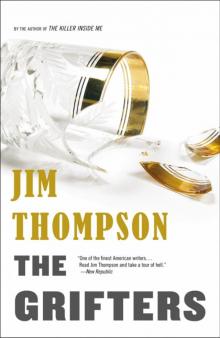 The Grifters
The Grifters The Transgressors
The Transgressors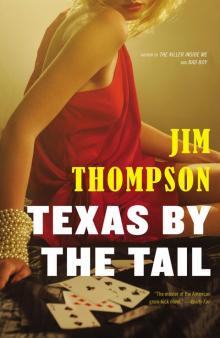 Texas by the Tail
Texas by the Tail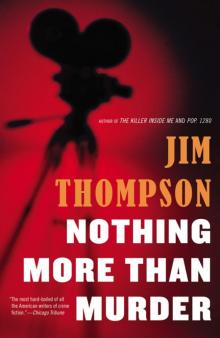 Nothing More Than Murder
Nothing More Than Murder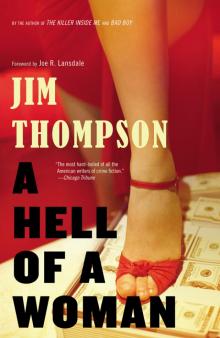 A Hell of a Woman
A Hell of a Woman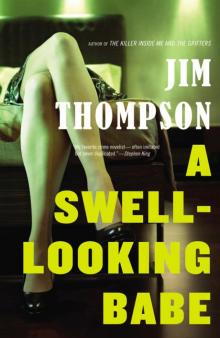 A Swell-Looking Babe
A Swell-Looking Babe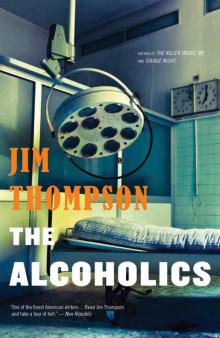 The Alcoholics
The Alcoholics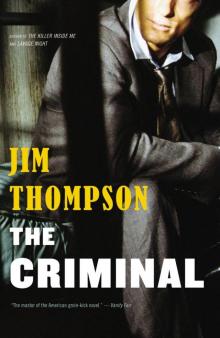 The Criminal
The Criminal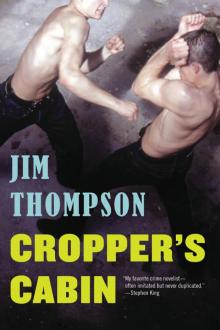 Cropper's Cabin
Cropper's Cabin South of Heaven
South of Heaven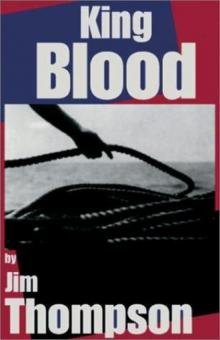 King Blood
King Blood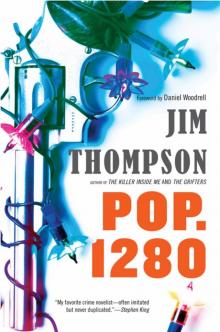 Pop. 1280
Pop. 1280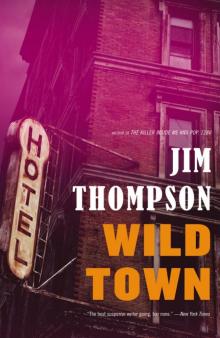 Wild Town
Wild Town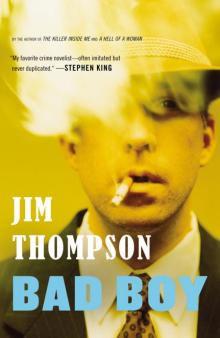 Bad Boy
Bad Boy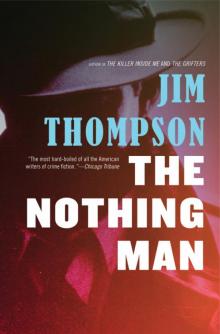 The Nothing Man
The Nothing Man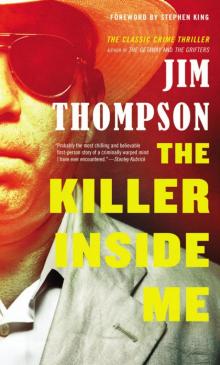 The Killer Inside Me
The Killer Inside Me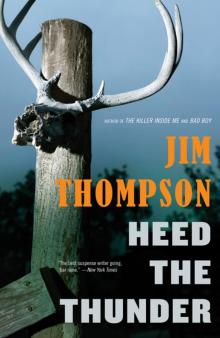 Heed the Thunder
Heed the Thunder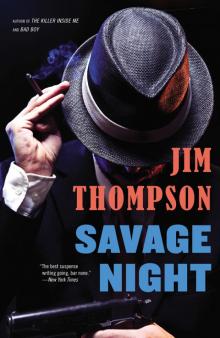 Savage Night
Savage Night Recoil
Recoil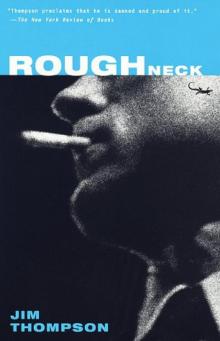 Roughneck
Roughneck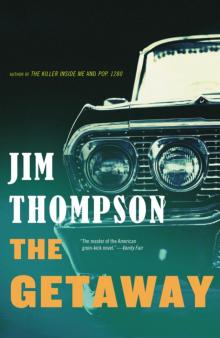 The Getaway
The Getaway